

Débat – Mlearning, mobile-learning, apprentissage nomade… The Different Uses of E-learning and M-learning. E-learning and m-learning have become extremely important buzz words of the education technology revolution; each characterising a whole raft of ideas and resources for the tech-savvy teacher.
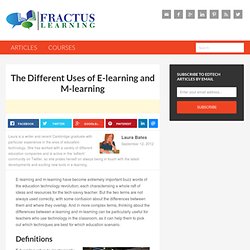
But the two terms are not always used correctly, with some confusion about the differences between them and where they overlap. And in more complex terms, thinking about the differences between e-learning and m-learning can be particularly useful for teachers who use technology in the classroom, as it can help them to pick out which techniques are best for which education scenario.
Definitions. Twitter un outil pédagogique pour la formation. LONGEON Thomas - Ingénieur Pédagogique Multimédia. Le coût de développement d'un module m-learning simple. The trouble with Khan Academy - Casting Out Nines. At some point around the beginning of February 2012, David Coffey — a co-worker of mine in the math department at Grand Valley State University and my faculty mentor during my first year — mentioned something to me in our weekly mentoring meetings.
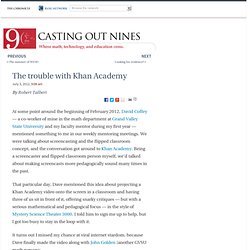
We were talking about screencasting and the flipped classroom concept, and the conversation got around to Khan Academy. Being a screencaster and flipped classroom person myself, we’d talked about making screencasts more pedagogically sound many times in the past. That particular day, Dave mentioned this idea about projecting a Khan Academy video onto the screen in a classroom and having three of us sit in front of it, offering snarky critiques — but with a serious mathematical and pedagogical focus — in the style of Mystery Science Theater 3000.
I told him to sign me up to help, but I got too busy to stay in the loop with it. Can Everyone Be a Successful Online Learner? Posted on Monday August 6, 2012 by Michael Keathley Education Week contributor Ian Quillen’s recent interview with Leslie Fetzer, 2012 National Online Teacher of the Year, was full of inspiration and hope for online education (13 June, 2012).
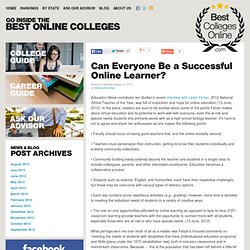
In the piece, readers are sure to be excited about some of the points Fetzer makes about virtual education and its potential to work well with everyone, even the at-risk and special needs students she primarily works with as a high school biology teacher. It’s hard to not to agree and share her enthusiasm as she makes the following points: • Faculty should focus on being good teachers first, and the online modality second. • Teachers must personalize their instruction, getting to know their students individually and building community collectively. • Community building easily extends beyond the teacher and students in a single class to include colleagues, parents, and other interested constituents. . • 97% of teachers had computers in their classrooms. E-Learning by HR Valley. Which Country is Leading Online Education? Online education, and the debate about, it is one of the hottest topics in education; whether you are an academic institution or a corporation looking to train your employees with a learning management system (LMS).
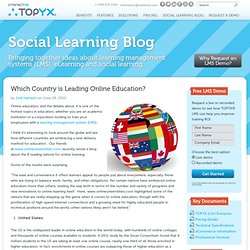
I think it’s interesting to look around the globe and see how different countries are embracing a new delivery method for education. Our friends at www.onlineuniverstities.com recently wrote a blog about the 8 leading nations for online learning. Mobile Learning: CHANGE YOUR WAYS OR YOU ARE DOOOOOMED! UNESCO1. UNESCO2. Nouveau document de l’UNESCO sur l’apprentissage mobile : Thèmes mondiaux. Why is e-learning so unpopular? Today at 7pm, Michael Allen, Julie Dirksen, Clark Quinn and Will Thalheimer, backed by a raft of other well-respected thinkers and practitioners in the field of workplace learning technologies will be launching the Serious eLearning Manifesto.
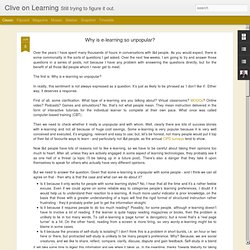
This campaign is the result of many years of discussions, lamentations and grumblings about the state of e-learning. It's time to do something about the problem before e-learning is discarded as a good idea that, in spite of 30 years of our best efforts, somehow never got to fulfil its potential. As usual, because this terminology means such different things to different people, I must clarify what sort of e-learning we're talking about here: the problem is with interactive, self-study materials accessed on a computer. Just One Question for Jeff Tillett: The Key to Good mLearning Design by Bill Brandon. M-learning et e-littératie. Mobile Learning. Mobile Learning Likely to ‘Gamify’ - But Not Systematically. Making m-learning inside companies more fun helps employees acquire knowledge.
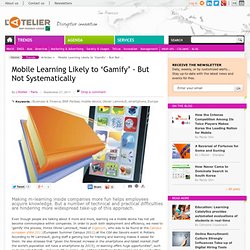
But a number of technical and practical difficulties are hindering more widespread take-up of this approach. Even though people are talking about it more and more, learning via a mobile device has not yet become commonplace within companies. In order to push both deployment and efficiency, we need to ‘gamify’ the process, thinks Olivier Lamirault, Head of Ingenium, who was to be found at the Campus européen d'été 2011(European Summer Campus 2011) at the Cité des Savoirs event in Poitiers. According to Mr Lamirault, giving staff a gaming tool for training and learning makes it easier for them. Gestion et gouvernance scolaires: Le m-learning.
Le m-learning et l'apprentissage du français langue étrangère by flora aubin on Prezi. Mobile learning in developing countries in 2012: What's Happening? In recent chats with officials from [an un-named country], I learned of the desire of educational policymakers there to leap frog e-learning through m-learning.
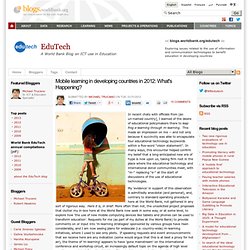
This made an impression on me -- and not only because it succinctly was able to encapsulate four educational technology buzzwords within a five-word "vision statement". In many ways, this encounter helped confirm my belief that a long-anticipated new era of hype is now upon us, taking firm root in the place where the educational technology and international donor communities meet, with "m-" replacing "e-" at the start of discussions of the use of educational technologies.
My 'evidence' in support of this observation is admittedly anecdotal (and personal), and, contrary to standard operating procedure here at the World Bank, not gathered in any sort of rigorous way. L’impact de la croissance du Mobile Learning sur le marché des Jeux Sérieux Educatifs - Actualité RH. Formation professionnelle : m-learning et jeux sérieux ont un bel avenir devant eux. Accueil. How Mobile Computing and the Semantic Web Will Change Learning Forever by Reuben Tozman.
“The future of the Web is to provide a learning environment where learners and content are linked through context, which is persistent regardless of where the learner is operating.

This is due in part to the notion of the Internet as an operating system, but is also a result of semantic technologies. “ The Internet has forever changed our world and our relationships to people and organizations within it. It continues to evolve, with many varied applications and technologies emerging. Mobile Learning - muxyvnaaq. Philosophie des jeux vidéo - Mathieu Triclot 1/2 - Blog Littéraire et vidéoludique. Petite lecture de la monographie proposée par Mathieu Triclot.
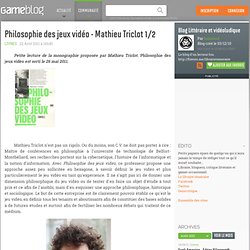
Philosophie des jeux vidéo est sorti le 26 mai 2011. Mathieu Triclot n'est pas un rigolo. Ou du moins, son C.V. ne doit pas porter à rire : Maître de conférences en philosophie à l'université de technologie de Belfort-Montbéliard, ses recherches portent sur la cybernétique, l'histoire de l'informatique et la notion d'information. Avec Philosophie des jeux vidéo, ce professeur propose une approche assez peu sollicitée en hexagone, à savoir définir le jeu vidéo et plus particulièrement le jeu vidéo en tant qu'expérience. Il ne s'agit pas ici de donner une dimension philosophique du jeu vidéo ou de tenter d'en faire un objet d'étude à tout prix et ce afin de l'anoblir, mais d'en esquisser une approche philosophique, historique et sociologique.
Getting Started Today With mLearning: Video Podcasting by Dave Mozealous. “Video Podcasting is something that you can start doing today to get involved in mobile development using your existing eLearning videos.

No need to wait for any technologies that are years off, or spend more money investing in expensive delivery platforms. Get started on developing your first video Podcast today.” Video Podcasting is an easy way for you to target mobile learning platforms today using your existing eLearning videos. Using your current software, you can take content that you already have and start delivering it to most of the current mobile platforms, including iPhone, iPad, Android phones and tablets, and most other popular smart phone platforms. Editor’s Note: Parts of this article may not format well on smartphones and smaller mobile devices.
In this article, I’ll explain what a Podcast is, the elements in a typical Podcast, and the growth in popularity of this format. Exploring the iPad for use in Higher Education. The iPad is often touted as a revolutionary new means of computing, but what exactly does that mean? How does one explore the capabilities of a device which changes with the apps which may be loaded? Should we be exploring the iPad as a device? Or, should we explore the educational experiences which might be possible though the Apps which are available? How can we explore the device, if we do not have the funding to explore promising applications? This is like learning to use a microwave/convection oven without having funding to by the elements required to cook a meal or develop a new recipe. Moving Toward 2020: The Learning Decade. Four hundred years ago, British philosopher Francis Bacon declared that "Knowledge is Power.
" And, until recently, many corporate leaders would have wholeheartedly agreed with him. But, today, as we struggle to cope with an uncertain economy, complex globalization, and unprecedented technological transformation, executives on just about every continent increasingly believe that "Knowledge is Survival. " Companies around the world responded to the Great Recession by cutting and controlling costs to reap new efficiencies.